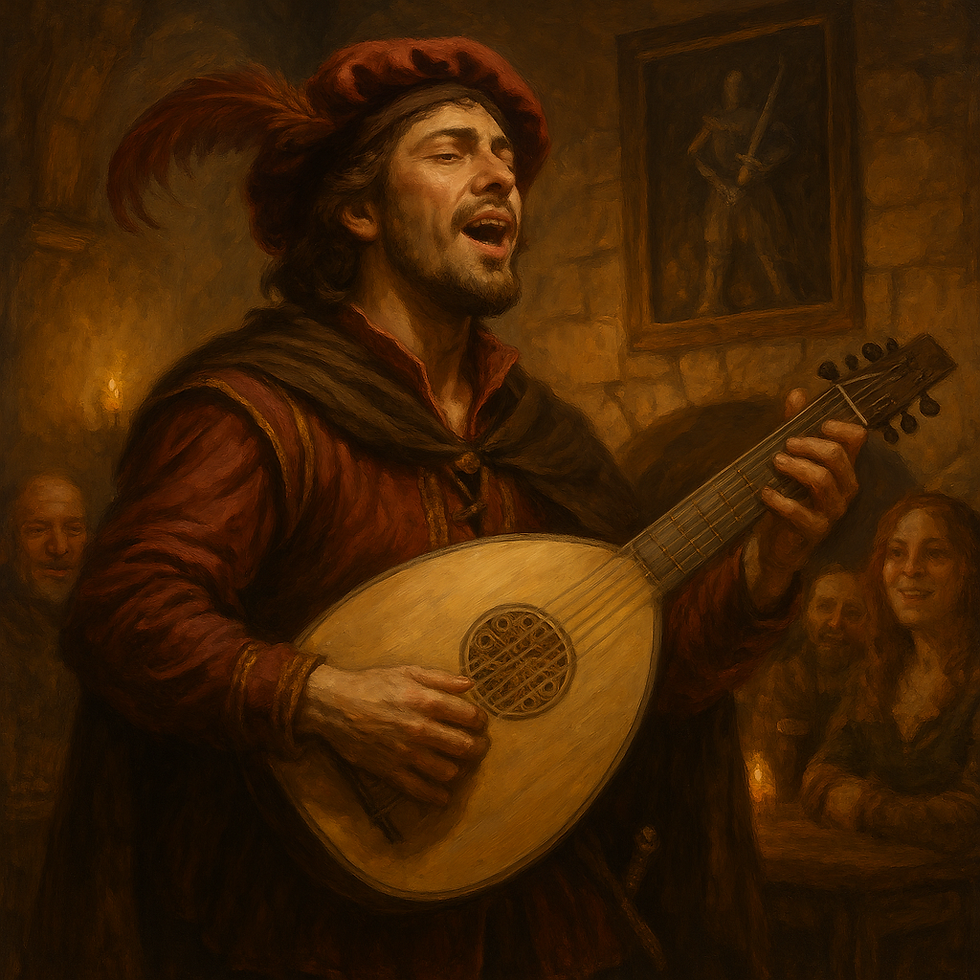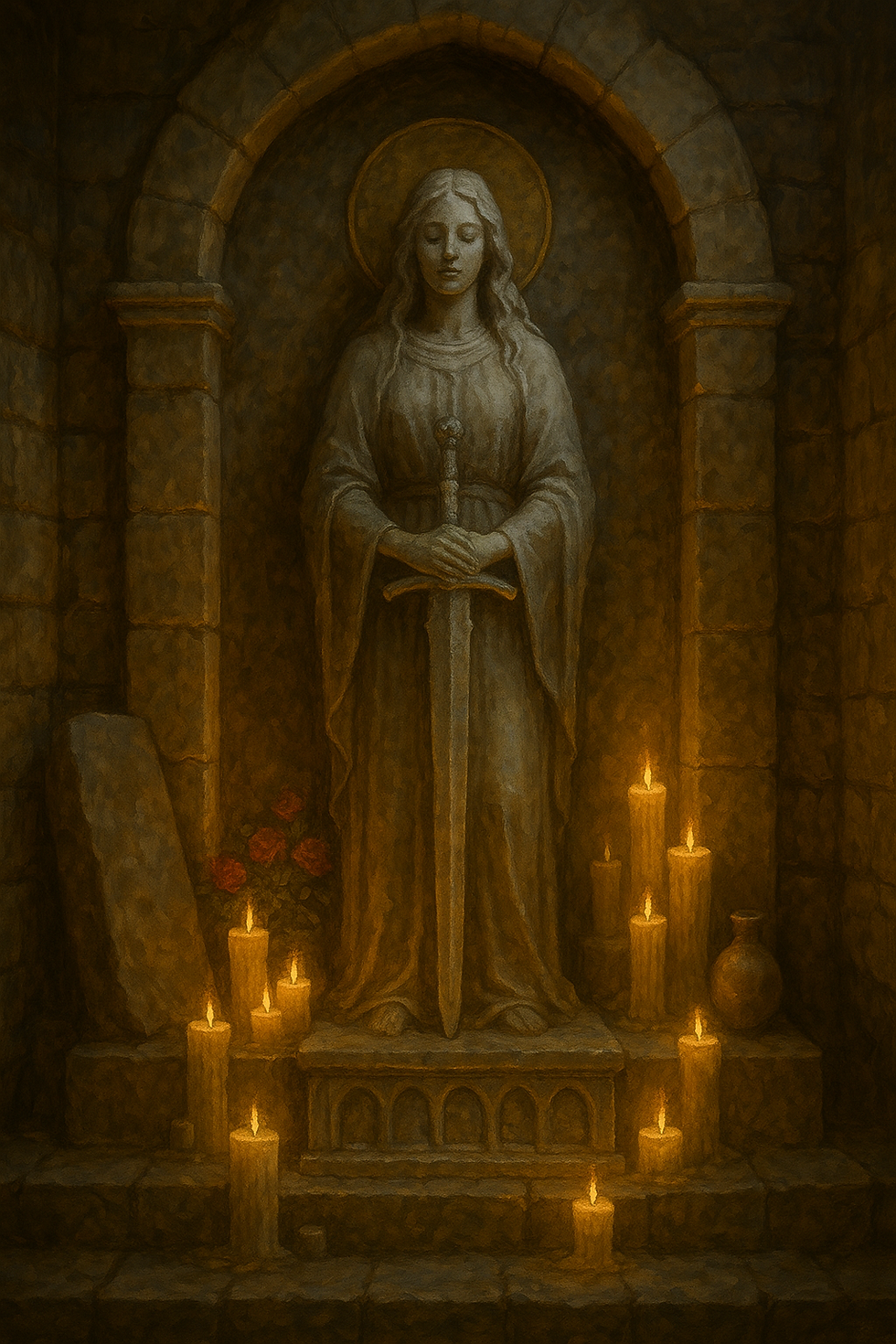D&D Worldbuilding Tips: When the NPCs Outlive the Heroes
- Nina Wu

- Aug 18, 2025
- 7 min read
Campaigns End, But Worlds Don’t
Heroes burn bright, but only for a while. Their songs echo in the tavern, their banners fly on the wind, their names are carved into stone… and then, silence. The dice stop rolling, the table clears, and the adventurers vanish into memory. Yet the world goes on.
The farmer still tends his fields, the priest still lights the dawn candles, the innkeeper still pours ale. They remember. They tell the tales. They misremember too, reshaping old deeds into myths that grow larger than life. A child who once watched the party march through her village might, years later, whisper to her own children about the giants who walked the earth.
This is how a world endures. Not through ledgers of lore or encyclopaedic notes, but through memory. Through NPCs who live on after the heroes are gone, carrying their stories, distorting them, celebrating them, cursing them. Long after the dice stop rolling, the world still whispers their names.
Your Eternal Chronicle
A campaign is just a story told once. A world becomes a tale that outlives the telling. The trick is simple, though it feels like magic: let NPCs remember, retell, and reshape the deeds of the heroes. When the farmer speaks of the adventurers who once saved his harvest, or the bard sings of the mighty Ithior, the wizard who cast the very first Sleep spell in the world of Kalthyraen, the party’s actions take root in the living soil of the world.
This is what makes stories never-ending—eternal. Not because the heroes return unchanged, but because the world itself insists on remembering them. Legends linger, growing stranger in the mouths of NPCs who pass them down, exaggerating the details, twisting failures into cautionary tales and victories into ballads. A rogue’s failed bluff becomes “the greatest lie ever told.” A duel spared in mercy becomes a whispered story of betrayal.
Players feel the pull because the tale is now larger than them. Their old characters don’t just vanish when the dice stop—they live on in memory, myth, and rumour. And when a new PC steps into that same world, they’re not just starting fresh. They’re stepping into a tale already alive, already echoing. That’s how a campaign becomes a world, and how a world becomes an Eternal Chronicle.
But here’s the truth: players won’t return to your world unless they experience it for themselves. Unless they feel the awe of being remembered. Unless the world reveres their character not as a sheet of stats, but as a legend who mattered.

How to Make the World Revere Them
Immortality in a roleplaying game isn’t found on a character sheet—it’s found in the world itself. If you want players to return to your fantasy setting again and again, you have to let them feel the weight of their legacy. Not in vague narration, but in living, breathing details that make their presence undeniable.
The key is awe. Reverence. The sense that the world has not forgotten.
Songs and Stories – Let a bard sing a verse about their victory, but embellish it until it’s almost unrecognisable. Half the fun is watching players laugh at how their own deeds have been exaggerated into myth.
Shrines and Relics – A small chapel with their name etched into the stone. A magic weapon they once used, mounted above a tavern hearth. A rare tome of their deeds, found only in the most revered of libraries. These physical reminders turn memory into something players can touch.
Whispers and Rumours – Have NPCs refer to them indirectly. “My grandfather said he once saw the heroes at Mistveil Heights.” “They say she never lost a duel—except the one that mattered.”
Living Legacies – Show apprentices, descendants, or followers whose lives were shaped by the PC’s actions. A rescued orphan who now leads the guard. A village rebuilt because of their sacrifice.
These gestures don’t need to be grandiose. In fact, the smallest ones are often the most powerful. A street renamed after a fallen rogue. A child clutching a toy sword and calling it by the hero’s name. A farmer who still remembers the night they saved his family from bandits.
When players see these echoes, they realise their characters mattered to the world itself. That’s what transforms a finished campaign into a living history—one worth revisiting, reshaping, and reliving.
From Deeds to Legends
Not every legend begins with a dragon slain or a kingdom saved. More often, it’s the small, almost forgettable moments that grow into myth once they pass through the mouths of NPCs. A bard doesn’t sing of the dice roll, they sing of the story.
A wizard fumbling through the first casting of Sleep becomes, in time, “The Great Dreaming, when Ithior bent the very world to slumber.”
A rogue’s botched bluff that drew laughter at the table turns into “the greatest lie ever told,” a trick so bold it fooled kings.
A duel spared in mercy, once a fleeting choice, echoes through generations as a tale of betrayal and blood.
This is the alchemy of memory: time distorts, NPCs embellish, and the trivial becomes titanic. The game you played at the table becomes the folklore your characters live inside.
As a DM, the secret isn’t to script legends, but to spot the sparks during play. A silly moment, a tense decision, a spell cast for the first time — all of these can be folded back into the world as lore. NPCs don’t remember dice rolls, but they remember deeds. And when those deeds come back to the players as myth, the world itself feels alive with their history.
That’s the point where a campaign grows beyond itself. Your world is no longer just a backdrop; it’s an archive, alive with half-truths, tall tales, and echoes that will outlive the heroes who made them.

The Organic Growth of a World
Campaigns are stories. Worlds are ecosystems. One tells a tale once, the other grows in every direction, layering memory like sediment. Each adventure, each decision, each NPC reaction—these become the soil of continuity.
What makes this growth organic is that it happens whether you plan for it or not. Players make choices, NPCs respond, myths distort, and over time the world becomes thicker with meaning. It’s not encyclopaedic lore dumped from on high; it’s living history created session by session, like tree rings marking the passage of years.
And here’s the secret: the growth doesn’t just happen in-game. It happens out of game too. Players will talk about the world over coffee, on Discord, or months after a campaign ends. They’ll trade stories of the deft ranger who slid down a portal’s ramp to take his place among gods and heroes in the endless war on Ysgard, or recall the night they cracked the unsolvable problem that saved a town from destruction. In that way, your world grows twice: once within the fiction, and once in the mouths and memories of the people around the table.
That double growth—in-game and out-of-game—is what makes a setting feel eternal. It’s not just that the NPCs remember. It’s that the players do too. And when they step into the world again, both memories collide: the myth whispered by the barkeep, and the story they themselves recall. Together, those echoes make the world feel vast, alive, and endlessly worth returning to.
Why Players Return Again and Again
A world that remembers is a world players can’t resist returning to. Not because you force them, not because you dangle hooks—but because curiosity gnaws at them. They need to know what became of the orphan they rescued, whether the spared duellist still whispers curses in the dark, or if their name has truly been carved into a chapel wall.
This is the hook deeper than any dungeon crawl: the desire to see themselves reflected in the world’s history. It’s nostalgia sharpened by surprise. The tavern may feel familiar, but the song sung inside has changed—and the players want to hear the new verse.
And it’s ownership too. When their old deeds echo, players no longer feel like passersby in your world. They feel like founders. Architects. Co-authors. That sense of legacy is intoxicating, because it assures them their choices mattered—not just at the table that night, but to the world itself.
That’s why they come back. Not for another quest. Not even for another character. They return because the world remembers. And because in remembering, the world makes them eternal.
Seeding Legacy: A DM’s Tools
Legends don’t need to be planned like blueprints. They only need to be planted, like seeds. As a DM, your role isn’t to script history, but to give the world reasons to remember—and to let those memories grow in surprising directions.
Here are ways to make it happen:
The Legacy Journal – Keep a simple log of the party’s deeds, big or small. Write them as an NPC might: biased, embellished, incomplete. That way you can bring them back later, reshaped into folklore.
Misremembering as Magic – Don’t repeat events with perfect accuracy. Let NPCs get it wrong. That’s the magic of how myths are formed. The wyvern they killed becomes an ancient red dragon. The narrow escape becomes a flawless victory. Exaggeration makes the tale larger than life.
Relics in Plain Sight – Place the past where players can touch it. A rusty sword above a fireplace. A shrine to a fallen companion. A festival reenacting their old deeds. These reminders don’t just say “you mattered”—they show it.
Callbacks and Echoes – Seed names, places, and consequences into future campaigns. A villain’s grandson seeking revenge. A ruined town rebuilt into a thriving city named after the adventurers. A bard who quotes an adventurer’s old words, half-wrong, half-true.
You don’t need sweeping histories or grand tomes. The most potent legends often come from the smallest details. A moment of mercy. A single magic spell. A ranger sliding into the eternal clash of Ysgard. These sparks are enough—the world and the players will do the rest.

Articles Must End, But Your World Doesn't Have To
Campaigns end. Characters fall, retire, or are forgotten. But the world goes on—and when the world remembers, so too do the players. NPCs become the keepers of memory, whispering names, retelling stories, misremembering deeds until they harden into legend.
That is how a setting outlives a single story. Not with endless lore-dumps or encyclopaedic timelines, but with memory—alive in tavern songs, etched into chapel stones, echoed in the mouths of villagers and kings alike. A world that remembers is a world that players will always return to.
Because long after the dice stop rolling, the NPCs still talk. The myths still grow. And the tale never truly ends.
Worldbuilding doesn’t need to be a mystical art, dripping in tropes or chained to high-fantasy epics. It thrives on the magic of adaptability and the small details noticed around the table.
For more D&D worldbuilding tips explore how adaptability can turn fleeting moments into legends.




Comments